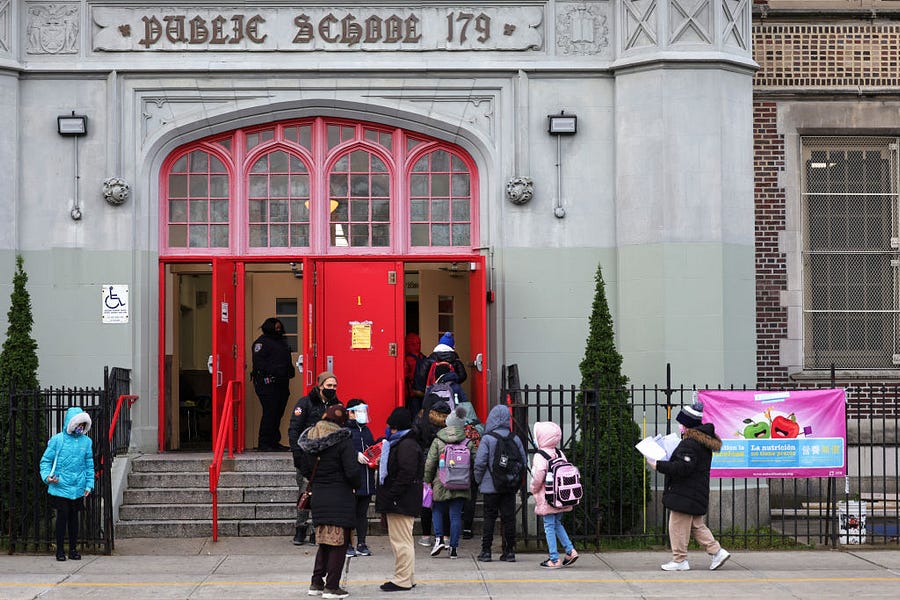In an era when demands for “equity” have inspired efforts to eliminate the SAT and defund charter schools, it’s no great surprise that gifted education has also been under attack.
This summer, after years of feints, Mayor Bill de Blasio ordered New York City’s schools to abandon the gateway gifted test, implement “accelerated learning” for all students in grades K-2, and then kinda, sorta figure out how to screen kids for a mélange of subject-specific accelerated elementary coursework. On cue, the New York Times blamed gifted education for producing “racially segregated classrooms and schools” (the Times seemingly struggles with the meaning of “segregation,” given the 4,000 black and Latino students in the city’s gifted elementary programs).
Gifted education has been taking it on the chin for years. Certainly, the No Child Left Behind era was a tough one for gifted education, as school systems focused intently on boosting basic skills among struggling students. And de Blasio’s attack is hardly sui generis. On the opposite coast, the education chair of the NAACP’s Seattle chapter has complained in regards to that city’s gifted program, “We want the program just abolished. Period. [It] is fundamentally flawed, and it’s inherently racist.”
Thankfully, de Blasio’s newly elected successor, Eric Adams, promises to reverse course on gifted education in NYC, the fight spotlights a larger challenge—and opportunity. Of course, gifted programs should be inclusive and designed so as not to morph into impermeable upstairs-downstairs caste systems. At the same time, Nobel laureate David Card has concluded that “a separate classroom environment is more effective for” gifted learners—especially those who are disadvantaged. We must not shrug off the problems with gifted education, but we cannot afford to be taken in by gauzy promises and nebulous notions of “accelerated learning” for all.
Before diving deeper into pedagogical rabbit holes, though, it’s worth asking two simple questions. First, when it comes to chess, basketball, piano, singing, or ballet, do some children have exceptional gifts and stand to benefit from exceptionally challenging instruction? Second, does this also apply to endeavors like poetry, calculus, or chemistry? It strikes me that the answer to both queries is an axiomatic “yes.” After all, it’s no great surprise that pro baseball players have exceptional eyesight; art and music prodigies excel on tests of working memory; or elite athletes tend to be blessed with fast-twitch musculature.
If one accepts that people are born with an array of talents, and that students and society benefit when schools cultivate children’s gifts, the conversation about gifted education should be how to do it fairly, responsibly, and effectively. But what we’re witnessing in New York City and elsewhere is not a discussion about how to do gifted education better but a woke assault on conventional notions of merit and excellence.
Earlier this year, California’s Instructional Quality Commission adopted a new mathematics framework that urges schools to do away with accelerated math in grades one through 10. With remarkable gall, the commission explained that this is actually all done out of consideration to math “high achievers,” as they’ll now be able to “take work to deeper levels rather than speed ahead with superficial understanding of content, and learn to appreciate the beauty of mathematics.” Uh-huh.
When pressed on whether this would stymie children with a particular aptitude or interest in math, the commission’s stance was perfectly clear: “We reject ideas of natural gifts and talents.”
That’s the crux of this debate. This is not a question of nuance and particulars—it is part of a wide-ranging attack on gifted programs, advanced instruction, traditional grading norms, and the very notion of academic merit.
Thomas Jefferson High School for Science and Technology, a magnet school founded in 1985 in Fairfax County, Virginia, and ranked as the nation’s top high school by U.S. News, eliminated its admission exam last year. Why? Ohio State professor of multicultural gifted education Donna Ford explained that since Jefferson’s black and Latino student population didn’t match the demographics of Fairfax County, “The school district [was] practicing discrimination.” The critiques have led to the adoption of a “holistic review process” that eschews the exam in favor of an admission process driven by GPA, a “student portrait sheet,” an essay, and “experience factors” (such as whether students are economically disadvantaged, in special education, or attend “underrepresented” middle schools).
In Boston, after temporarily suspending admissions tests for the city’s three famed exam schools, the school committee recently voted to dramatically reduce the role of the admissions test. Now, admissions will be based primarily on GPA and zip code, with the exam score accounting for only 30 percent of an applicant’s score. There was a late compromise in which the board grudgingly reserved 20 percent of seats for students who fare highest on the exam. The decision to set aside any seats for those high-performers was derided by critics as a self-serving ploy by the privileged.
In San Diego, under now-U.S. Deputy Secretary of Education Cindy Marten, the school district embraced “equitable grading standards” in which students no longer face academic consequences for late work or poor work habits. The goal is to eliminate “non-academic factors,” like student behavior, from academic grades—as if those two things can be readily disentangled. In Oregon, earlier this year, the legislature eliminated the requirement that high school graduates demonstrate proficiency in reading, writing, and math. A spokesman explained that the state needed “equitable graduation standards” more appropriate for “Oregon’s Black, Latino, Latina, Latinx, Indigenous, Asian, Pacific Islander, Tribal, and students of color.” That came not long after Oregon’s Department of Education urged teachers to abandon such racist math practices as asking students to “show their work” or focus on “getting the ‘right answer.’”
This assault on rigor, excellence, and merit is doomed to eventually fail (after all, this is a bit of education cinema that we’ve seen many times before), but only after leaving a trail of wreckage and frustration in its wake. After all, when schools abandon gifted learners, affluent families will move their kids to private schools or pony up for tutors, enrichment programs, and online courses. It’s the low-income students who will get lost along the way. Former Washington, D.C,. math teacher and Teach For America alum Colin Seale put it well: “I often get the side-eye when I mention gifted education and equity in the same sentence [but] shutting down gifted programs only deepens the inequities for brilliant, underrepresented students of color and adds another barrier to unlocking their genius. … Since when does equity mean everyone gets nothing?”
As Harvard’s Todd Rose explains in The End of Average, those crusading for equity by dismantling specialized, rigorous programs wind up trying “to maximize individual opportunity on average by ensuring everyone has access to the same standardized system, whether or not that system actually fits.” Despite brave talk of “differentiation” and “personalization,” Rose notes, “almost everything about traditional education systems remains designed to ensure students receive the same exact standardized experience.” Those who trust the New York City Department of Education, California’s education apparatus, or woke bureaucrats in Oregon to overcome this challenge where generations of reformers have failed are, I think, unduly optimistic.
There are real, practical problems to address, which is what makes the woke education complex’s nihilistic assault so frustrating. It makes it harder to address the very issues that its adherents claim to care about.
For instance, while the bulk of the research suggests that acceleration, not enrichment, is the most promising way to serve gifted students, a 2019 survey of 2,000 schools found that most gifted programs focus on activities, projects, and games rather than advanced instruction. And researchers have raised serious concerns about the fact that minority students are less likely to be selected for gifted programs.
In New York, two particular complaints loom large: the fact that gifted admission is based on a test given to 4-year-olds and that the results are used to sort students into gifted programs for all of elementary school. Those are reasonable critiques that deserve to be addressed. While it’s hard to say what the “right” age is at which to test kids for giftedness, 4 does seem awfully young to make absolute determinations. It seems axiomatic that students should have the opportunity to be retested and admitted to gifted programs at multiple points; that school systems need to ensure that all children are tested for gifted programs or, at least, make testing accessible for all; and that schools need to develop reliable on-ramps and off-ramps into and out of gifted education.
And yet, for all these legitimate concerns, there’s a reason why Eric Adams has pledged to preserve the gifted program. Most Americans don’t want to see good schools and programs turned into political pinatas; what they want is to be confident that these programs are rigorous, inclusive, and fair. Even in our equity-conscious age, the public is comfortable, perhaps surprisingly so, with merit-based selectivity. Phi Delta Kappan reported last year that 83 percent of adults think it appropriate to use test results when determining eligibility for “special” academic programs. I’ve long found that most parents like the promise of these programs. That’s especially true in low-income communities where parents know their kids are denied opportunities that others enjoy. But the enthusiasm depends on how confident parents are that their own kids stand to benefit.
That presents a hell of an opportunity. Indeed, it suggests that an excellence agenda would have broad appeal. Advocates for excellence need to do much more than play defense. In an era of ubiquitous remote learning, it should be a given that every qualified high school student—wherever they go to school—should have access to a full suite of Advanced Placement offerings. School choice programs and investors should embrace the chance to launch and grow schools that offer gifted or advanced instruction, like the Arizona-based BASIS Schools, in a sector that has traditionally given short shrift to such students.
Three years ago, in a “Culturally Responsive Equity-Based Bill of Rights for Gifted Students of Color,” a group of equity scholars argued that “gifted students of color” need skilled gifted educators, gifted programs committed to recruiting and retaining them, and access to gifted programs and services, including “Advanced Placement, accelerated, magnet, early college, and other programs for advanced students/learners.” They’re right. In fact, when equity is understood thusly, there’s endless opportunity for simultaneously pursuing equity and excellence.
We need many more teachers prepared to teach gifted students, especially given a pipeline that attracts too few teachers skilled in the sciences or advanced instruction. That suggests an opportunity to approach training, licensure, recruitment, and pay with an eye to improving instruction in advanced classes and for gifted students.
State and school system leaders should prioritize expanding the International Baccalaureate program, Advanced Placement courses, K-8 gifted offerings, and high-caliber opportunities in areas like robotics or music—and then make special efforts to ensure that every child is considered for and given the supports that can help them thrive in such programs.
All students need and deserve these things, perhaps most especially those who’ve been denied such opportunities. An excellence agenda can help deliver them.
Frederick M. Hess is director of education policy studies at the American Enterprise Institute.






Please note that we at The Dispatch hold ourselves, our work, and our commenters to a higher standard than other places on the internet. We welcome comments that foster genuine debate or discussion—including comments critical of us or our work—but responses that include ad hominem attacks on fellow Dispatch members or are intended to stoke fear and anger may be moderated.
With your membership, you only have the ability to comment on The Morning Dispatch articles. Consider upgrading to join the conversation everywhere.